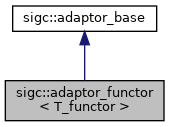Converts an arbitrary functor into an adaptor type. More...
#include <sigc++/adaptors/adaptor_trait.h>

Public Member Functions | |
| adaptor_functor ()=default | |
| Constructs an invalid functor. | |
| adaptor_functor (const T_functor &functor) | |
| Constructs an adaptor_functor object that wraps the passed functor. | |
| template <typename T_type > | |
| adaptor_functor (const T_type & type) | |
| Constructs an adaptor_functor object that wraps the passed (member) function pointer. | |
| decltype(auto) | operator() () const |
| Invokes the wrapped functor passing on the arguments. | |
| template<typename... T_arg> | |
| decltype(auto) | operator() (T_arg &&... arg) const |
| Invokes the wrapped functor passing on the arguments. | |
Public Attributes | |
| T_functor | functor_ |
| Functor that is invoked from operator()(). | |
Detailed Description
struct sigc::adaptor_functor< T_functor >
Converts an arbitrary functor into an adaptor type.
All adaptor types in libsigc++ have a template operator() member of every argument count they support. These functions in turn invoke a stored adaptor's template operator(), processing the arguments and return value in a characteristic manner. Explicit function template instantiation is used to pass type hints thus saving copy costs.
adaptor_functor is a glue between adaptors and arbitrary functors that just passes on the arguments. You won't use this type directly.
The template argument T_functor determines the type of stored functor.
Constructor & Destructor Documentation
◆ adaptor_functor() [1/3]
|
default |
Constructs an invalid functor.
◆ adaptor_functor() [2/3]
|
inlineexplicit |
Constructs an adaptor_functor object that wraps the passed functor.
- Parameters
-
functor Functor to invoke from operator()().
◆ adaptor_functor() [3/3]
|
inlineexplicit |
Constructs an adaptor_functor object that wraps the passed (member) function pointer.
- Parameters
-
type Pointer to function or class method to invoke from operator()().
Member Function Documentation
◆ operator()() [1/2]
|
inline |
Invokes the wrapped functor passing on the arguments.
- Returns
- The return value of the functor invocation.
◆ operator()() [2/2]
|
inline |
Invokes the wrapped functor passing on the arguments.
- Parameters
-
arg Arguments to be passed on to the functor.
- Returns
- The return value of the functor invocation.
Member Data Documentation
◆ functor_
|
mutable |
Functor that is invoked from operator()().